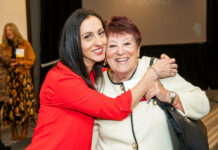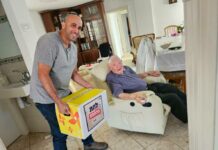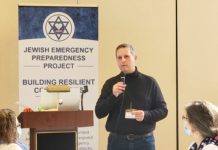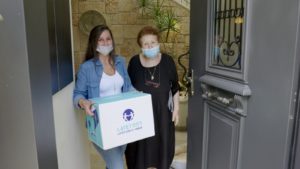
“Somebody has to help the Holocaust survivors in their last days,” said Dov Yakubovitch z”l, a survivor of Auschwitz concentration camp. “If there are people who care about them, the smallest gesture can help. It warms my heart to know someone cares.”
Sadly, Yakubovitch passed away earlier this year. He is one of approximately 40 Holocaust survivors to die every day in Israel. Despite living in poverty, losing his wife and going blind, Yakubovitch did know the care that he wished for other survivors. As a client of Latet’s Aid For Life program, Yakubovitch received support, community and essential items.
Latet is the largest nongovernmental organization combating poverty and food insecurity in Israel. Acting as an umbrella organization for 180 local associations, Latet operates the leading national food bank and runs holistic aid programs for thousands of people in need. The Jewish Federation of Greater Philadelphia, in partnership with Seed the Dream Foundation, is proud to support the work of Latet, and particularly in the past year throughout the pandemic.
In 2007, Latet introduced the Aid for Life program to specifically address the needs of Holocaust survivors. The initiative provides a wide array of services, including food, dental, eyeglasses, hearing aids, diapers, home repairs and volunteer companionship.
For Gabrielle Pittiglio, Latet’s international resource development director, Aid for Life is meant to be a “family” for survivors who are in desperate need of help.
In all, the local Jewish Federation serves about 15,000 Holocaust survivors in Israel through its various supported programs, such as Latet’s Aid for Life.
Pittiglio calls the high poverty rate among Holocaust survivors a “scandal.”
“They’re elderly people, and we have a moral duty towards them,” explained Pittiglio, whose own grandmother survived the Holocaust in France. “They went through the Shoah, they built the country with their bare hands and, today, one-quarter of them live in poverty.”
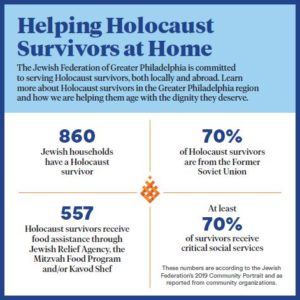 David Wagner, 94, is one of many survivors who built the “country with their bare hands,” but is now impoverished and relies on Aid for Life.
David Wagner, 94, is one of many survivors who built the “country with their bare hands,” but is now impoverished and relies on Aid for Life.
After surviving the death marches in Ukraine, Wagner moved to Israel and fought with the First Artillery Corps of the Israel Defense Forces, fighting in three wars: the War of Independence, the Six-Day War and the Yom Kippur War. As a commander of his unit, Wagner saved 18 of his soldiers’ lives during the Yom Kippur War. Following the army, Wagner “worked hard and earned [his] money honestly.”
“There is not one job I didn’t do in Israel. Agriculture, carpentry, fishing,”
Wagner said.
But it wasn’t enough. Wagner struggles financially, living off his social security stipend and the little he receives as a Holocaust survivor.
“I fought for this country and didn’t receive anything in return,” Wagner said.
More important than the tangible assistance Wagner receives from Aid for Life, he appreciates how the program makes him feel less alone.
“Latet doesn’t give me just a box of food. The girl who’s bringing the box isn’t leaving right away,” Wagner said. “She sits with me, we talk, we’re friends.”
Each Holocaust survivor is paired with a dedicated volunteer who visits them on a regular basis. Volunteers are screened and selected on their level of commitment, reliability and aptitude to connect with older populations, particularly those who have faced insurmountable trauma.
“Everywhere in the world, the No. 1 problem with elderly people is loneliness. It has an effect on psychological health and even on their physical health,” said Pittiglio of Latet, which means “to give” in English. “A lot of them are living alone in their houses and they have no contact with the outside world, so it’s important for us to alleviate their loneliness.”
Over the past year, the COVID-19 pandemic has exacerbated isolation among aging populations. In addressing this need while maintaining safety practices, Aid for Life volunteers increased their contact efforts through phone calls. Some have even had conversations through closed doors as a safe alternative to speak with survivors.
Typically, Aid for Life serves around 1,000 Holocaust survivors. Within the first three months of the pandemic, that number rose to 3,300. This is in addition to the 15,000 elderly people who are not Holocaust survivors that Latet serves.
On top of annual funding, the Jewish Federation, in partnership with Seed the Dream Foundation, proudly gave Latet multiple rounds of emergency funds to meet the growing needs of its clients during the pandemic. The Jewish Federation also allowed Latet to allocate its overall funds to areas that needed the most support — such as the Aid For Life program.
“It was incredible to have that trust and to be able to use the funds where they were needed most,” said Pittiglio, noting that the Jewish Federation is one of Latet’s main and oldest relationships. “That trust is the best you can ask for from a partner.”



